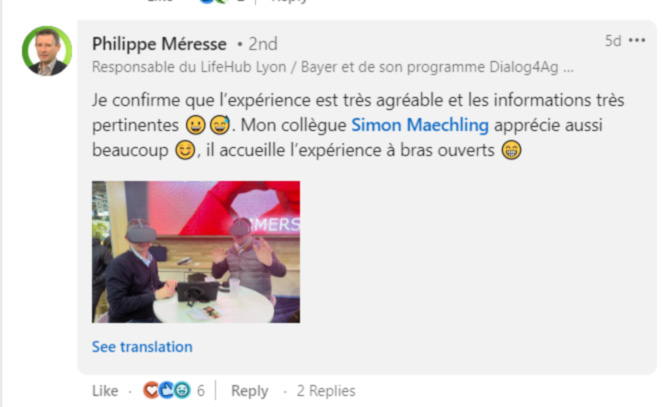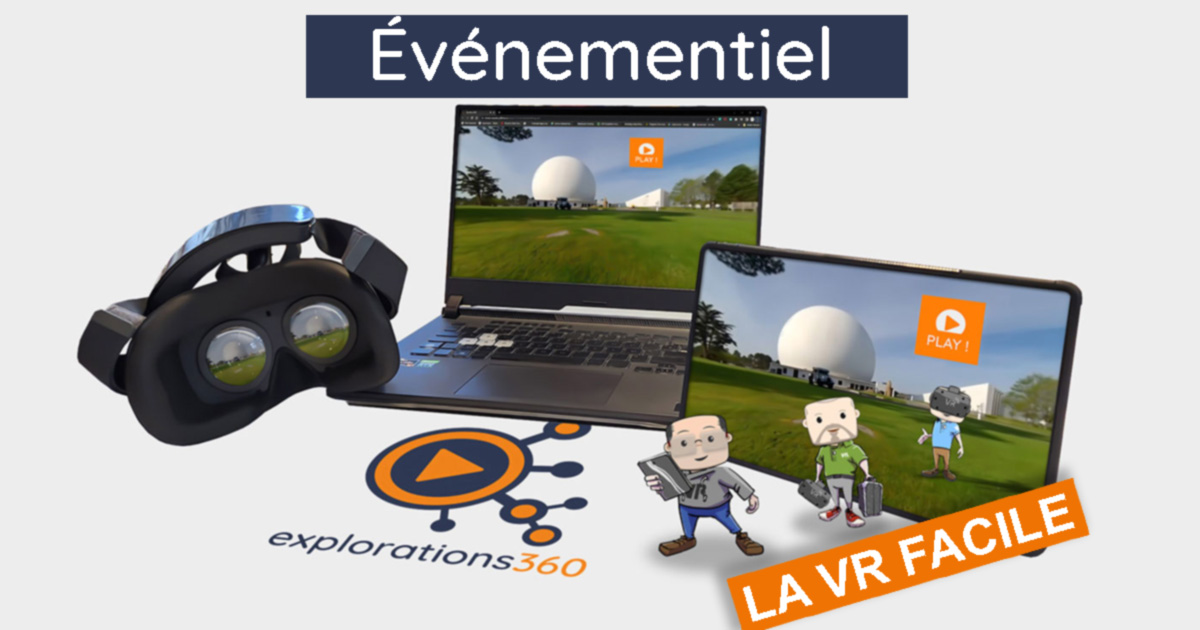PROVIDE MEMORABLE ENTERTAINMENT FOR YOUR EVENT
Memorable impact: make your events a unique and unforgettable experience.
Active participation: offer real-time interaction to engage your audience.
Mobility and simplicity: solutions such as easybox360 enable fast, efficient implementation.
The 3 essentials for transforming your results!
VR and events: the need for reliability and autonomy
Virtual reality (VR) is an innovative technology that has been used for several years in the event industry.
Our platform ensures the reliability and stability of immersive experiences, thanks to a dedicated system that's lightweight, autonomous and easy to set up.
A memorable experience
VR can be used in many different types of events, such as trade shows, team-building sessions, conferences, festivals, sporting events, concerts, and so on. It can be used to provide interactive presentations, product demonstrations, simulations, themed "escape games", and much more.
One of our best sellers for trade shows:
VR helmet case + personalized animations.
Teaser animation for the Salon de L'agriculture (SIA Paris): https: //www.youtube.com/watch?v=e59RC4cOrDM




User involvement and customer feedback
VR makes it possible to create personalized experiences for each participant, greatly increasing engagement and satisfaction. For example, you can change the language on the fly in each VR headset, depending on the audience. All this can be managed via a control tablet that pilots all the headsets.
Our platform allows you to integrate 360° video and create VR forms or quizzes to gather feedback from participants and understand their behavior.
Things to remember
1. Total immersion for participants
Thanks to virtual reality, event participants can be totally immersed in realistic virtual environments. They can interact with virtual objects and characters, creating an engaging and memorable experience. Total immersion opens up new storytelling and presentation possibilities, captivating participants' attention.
2. Virtual exploration of the site
Virtual reality allows participants to experience physical locations virtually, even before the event. This is particularly useful for events taking place in inaccessible or remote locations. Attendees can explore the venue, see the installations and familiarize themselves with the environment, helping them to better prepare and anticipate what lies ahead.
3. Interactive and personalized experience
With virtual reality, participants can enjoy a personalized, interactive experience. They can interact with the virtual elements of the event, personalize their experience according to their preferences, and even make decisions that influence the course of the event. This creates a stronger sense of involvement and commitment among participants.
4. Reduce costs and logistical constraints
Organizing a physical event can be costly and logistically complex. Virtual reality significantly reduces these constraints. Virtual events require fewer material resources and on-site personnel, reducing overall costs. What's more, participants can attend a virtual event from anywhere in the world, eliminating travel and accommodation costs.
5. Increased accessibility
Virtual reality makes events more accessible to people with physical or geographical limitations. Participants can attend a virtual event from the comfort of their own homes, eliminating the barriers of distance or reduced mobility. This enables a wider audience to participate in events and promotes inclusion.
6. Data measurement and analysis
During a virtual event, valuable data on participant behavior can be collected and analyzed. We can measure the time spent on each activity, the interactions achieved, the preferences and comments of participants. This data provides invaluable information for improving future events and better meeting audience expectations.
7. Differentiation and memorable impact
The use of virtual reality in events allows you to stand out from the crowd and create a memorable impact. Participants are more likely to remember an event that offered them a unique, immersive experience. This can reinforce the brand or event organizer's reputation and foster greater loyalty among participants.
8. Remote collaboration options
Virtual reality facilitates remote collaboration at events. Participants can interact and work together in shared virtual environments, even if they are in different locations. This makes it possible to organize international events without the constraints of physical travel, encouraging the participation of people from all over the world.
9. Adaptability to sanitary constraints
In times of health constraints, virtual reality offers an alternative solution to physical events. Participants can attend virtual events while respecting social distancing measures and avoiding mass gatherings. This enables event activity to be maintained while guaranteeing the safety and health of participants.
10. Testing innovative concepts
Virtual reality offers a blank canvas for experimenting with innovative event concepts. Unique virtual environments, immersive sensory experiences and original interactions can be created. Event organizers can push back the limits of creativity and offer unique experiences that impress participants.
11. Increased awareness
Thanks to the innovative aspect of virtual reality, events using this technology tend to attract increased attention. The media and participants are often curious to discover these new and engaging experiences. This can generate greater media coverage and awareness for the event and its objectives.
12. Environmental sustainability
Organizing virtual events reduces the ecological footprint of physical events. Less travel means fewer greenhouse gas emissions. What's more, the material resources used to organize virtual events often consume less energy and raw materials. Virtual reality therefore offers a more sustainable solution for events.
13. Effective marketing and promotion
Virtual reality offers unique possibilities for marketing and promoting an event. Organizers can create virtual experiences prior to the event to generate excitement and interest among potential participants. Virtual demonstrations, immersive videos and interactive teasers can be used to attract attention and generate buzz around the event.
14. Immersive learning and training
Virtual reality is a powerful tool for learning and training. In the event context, it enables immersive, interactive training sessions. Participants can experience realistic simulations, practice specific skills and benefit from real-time feedback. This facilitates the acquisition of knowledge and the memorization of information.
15. Interactive entertainment
Finally, virtual reality offers endless possibilities for entertainment and interactive activities at events. Virtual games, immersive shows, virtual art performances and much more can be integrated to provide a unique and captivating entertainment experience for participants.

